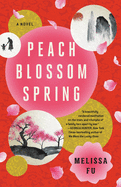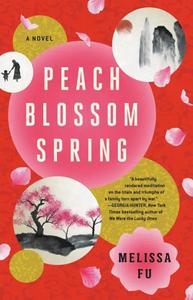
 Debut novelist Melissa Fu draws on her family's history to create a captivating story of immigration, family secrets and deep love in Peach Blossom Spring. Fu begins her narrative in 1938, as the Japanese army advances in China. Meilin, a young mother working in her father-in-law's antiques shop, is forced to flee to the countryside with her young son, Renshu, and her husband's family. Hidden in Meilin's luggage is an elaborate hand scroll featuring vividly drawn scenes from myth and history. The scroll and its stories bring comfort to Meilin and Renshu as they travel through often dangerous conditions, searching for safety. Eventually settling in Taiwan, the two build a new life for themselves, though it is marked by grief and always shadowed by the possibility of further upheaval.
Debut novelist Melissa Fu draws on her family's history to create a captivating story of immigration, family secrets and deep love in Peach Blossom Spring. Fu begins her narrative in 1938, as the Japanese army advances in China. Meilin, a young mother working in her father-in-law's antiques shop, is forced to flee to the countryside with her young son, Renshu, and her husband's family. Hidden in Meilin's luggage is an elaborate hand scroll featuring vividly drawn scenes from myth and history. The scroll and its stories bring comfort to Meilin and Renshu as they travel through often dangerous conditions, searching for safety. Eventually settling in Taiwan, the two build a new life for themselves, though it is marked by grief and always shadowed by the possibility of further upheaval.
Diligent and serious-minded, Renshu does well in his studies, eventually earning a place at a university in the U.S. Fu chronicles Renshu's adjustment to life in a new land, his reinvention of himself as Henry Dao, and the casual racism and surprising acceptance he finds in the Midwest. His eventual career as a Cold War-era physicist leads him to Los Alamos, N.Mex., where he and his American wife settle down and raise their daughter, Lily. When Lily starts asking questions about her Chinese heritage, Henry finds himself reluctant to answer her queries, even angered by them. Meanwhile, Meilin has lived quietly for many years in Taiwan, making the long journey to spend a summer with Henry and his family only once.
Fu writes sensitively about the concerns of multiple generations of immigrant families: the daily needs of survival during traumatic times, the fierce determination to protect one's children and give them better opportunities, the difficulties of sharing a family history that includes so much pain. While Meilin cannot protect Renshu from the hardships they face, she does her best to lighten the days with stories and affection. Years later, Renshu--now Henry--finds it difficult to share any of his own past with Lily, wanting to shield her from pain. Meilin and Lily, while they enjoy one another's company, are hampered by the barriers of language and context. Fu's thoughtful third-person narration gives readers a sense of all three characters' perspectives, as well as a slice of modern Chinese history.
Richly described, with deeply compassionate protagonists, Peach Blossom Spring is a haunting tribute to immigrant families and a gorgeous meditation on how stories can shape identity. --Katie Noah Gibson, blogger at Cakes, Tea and Dreams
Shelf Talker: Debut novelist Melissa Fu's captivating story of a Chinese-Taiwanese-American immigrant family is a gorgeous meditation on stories and identity.

